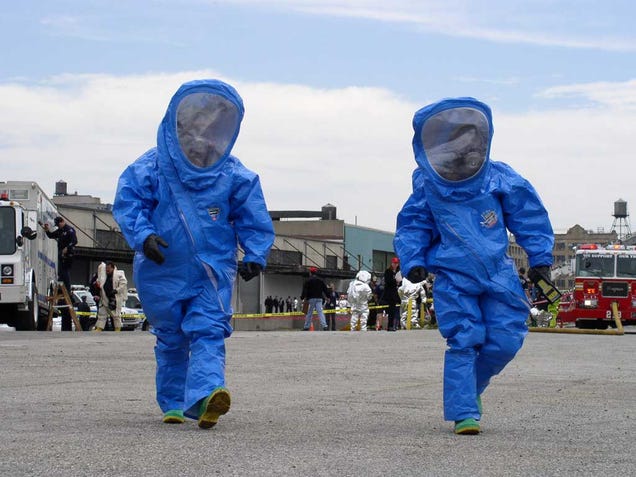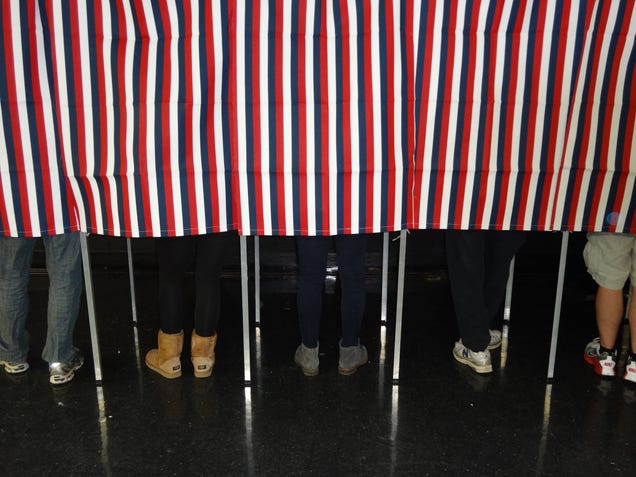Americans Are Now More Concerned About Terrorism Than Civil Liberties

The polls have spoken: Americans are afraid, again. 47% believe the U.S. is less safe than it was before the 9/11 terror attacks in 2001, up from 28% last year. And concerns about protecting civil liberties have dropped from 47% to 35%. But will this change in mood last? And how will it impact the midterm elections?
The recent surveys, conducted by the Pew Research Center and the Wall Street Journal/NBC News poll, both tell a similar story, and offer an intriguing glimpse into the current national psyche. As the WSJnotes:
This renewed fear reverses a seven-year trend, spanning all of the Obama term so far, in which such concerns were either stable or declining. The fear also helps explain why the public moved so quickly in recent weeks from reluctance to engage again in the Middle East to grim belief that it's in the American interest to act in the Middle East.
Among the key findings of both polls:
- 62% are very concerned about the rise of Islamic extremism around the world, which is the largest share dating back to 2007. A somewhat smaller majority (53%) is very concerned about the possibility of rising Islamic extremism in the U.S, which ties a record high.
- There's a shifting balance between concerns about civil liberties and protection from terrorism. In a reversal from last year after Edward Snowden's NSA leaks, 50% today say they are more concerned that government anti-terrorism policies have not gone far enough to protect the country, while 35% are more concerned that the policies have gone too far in restricting civil liberties.
- There has been a substantial drop in the public's ratings of the government's efforts to reduce terrorism. Though a 56% majority says the government is doing very well or fairly well, this is down from 72% last year; 42% say the government is doing not too well or not at all well, which nears the post-9/11 high of 44% in early 2007.
What The Polls Don't Tell Us
One issue that these polls didn't cover is the extent to which other events, besides the rise of ISIS, are contributing to this renewed climate of fear. Knowing that would help provide an indicator as to how much this shift in mood will be tied exclusively to how events unfold in the Middle East.

For instance, two polls last month revealed that between 39% and 46% of Americans are concerned about an Ebola outbreak in the U.S. It even turned up as a political issue in the U.S. Senate race in Arkansas, where Democrat Mark Pryor's campaign put out an ad that told voters his challenger, Republican Tom Cotton, had helped encourage the spread of the Ebola virus through his legislative inaction.
Meanwhile, another recent poll revealed that 69% of Americans see Russia as a threat to the United States, the highest level recorded since the breakup of the Soviet Union. Nearly 50% believe we are seeing the beginning of a new Cold War, while 40% worry about a nuclear war with Russia.
It's also notable that a sizable number of Americans fear a terrorist attack on U.S. soil, despite the efforts of the Obama administration to play down the imminent likelihood of such a threat. All of this points to the broader question: how deep is this pervasive feeling of vulnerability? The answer to that could shed insight on how Americans will respond to a variety of issues, ranging from domestic surveillance to immigration.
Republicans are already linking fears of terrorism to immigration. As the New York Timesreports:
Militants for the Islamic State in Iraq and Syria have traveled to Mexico and are just miles from the United States. They plan to cross over the porous border and will "imminently" launch car bomb attacks. And the threat is so real that federal law enforcement officers have been placed at a heightened state of alert, and an American military base near the border has increased its security.
As the Obama administration and the American public have focused their attention on ISIS in recent weeks, conservative groups and leading Republicans have issued stark warnings like those that ISIS and other extremists from Syria are planning to enter the country illegally from Mexico. But the Homeland Security Department, the F.B.I. and lawmakers who represent areas near the border say there is no truth to the warnings.
Democrats say opponents of President Obama are simply playing on concerns about terrorism as part of their attempt to portray Mr. Obama as having failed to secure the border against illegal immigration.
And what about domestic surveillance? Here, too, the polls don't provide very much detail. It's one thing to talk about it in the abstract, but the polls that are most revealing are those that dig down deeper and look more specifically at what Americans are willing and unwilling to accept, even amid heightened concerns about security: Should government be monitoring all credit card purchases? Personal phone calls? Emails? Should there be more surveillance cameras in U.S. cities? Should everyone be subjected to increased surveillance? Or just whomever the government considers to be high-risk suspects?
If, over time, terrorist attacks against Americans don't occur, then another domestic surveillance scandal could quickly change the national mood. One example is what happened in the second term of the Bush administration, amid reports that the White House had authorized the NSA to monitor phone calls and emails without court permission. According to a previous Pew Research Survey, the number of Americans who said it was necessary to give up civil liberties to curb terrorism dropped to 27% in 2009, down from 43% just two years earlier.
Who Gains The Political Advantage?

Republicans voters are more worried about the threat of terrorism than Democratic voters. That fact alone doesn't shift the dynamics in the forthcoming election, but other poll results paint a picture indicating the GOP could see increased support from specific demographic groups. As the Wall Street Journal notes:
The share of women who think the U.S. is less safe has jumped to 52% from 32% in the last year. The share of men, meanwhile, is 40% now, up from 23%.
The elderly, meanwhile, express much higher fear than do the young. Among those aged 18 to 34, the share saying the U.S. is less safe is 29%, just eight percentage points higher than a year ago. Among those aged 65 and over, meanwhile, the share expressing fear has jumped 19 percentage points, to 59% from 40%.
Elderly voters tend to turn out in greater numbers in midterm elections than do younger voters, so feelings of insecurity among the elderly would figure to be of potential benefit to Republicans. Similarly, women voters are a key constituency for Democrats, and any defections among them over questions of national security would be a particular problem.
Another point possibly in the GOP's favor: According to Pew, concerns over terrorism have jumped dramatically among the Tea Party, from 33% to 59% in just one year. If national security emerges as the dominant issue among Tea Party members in this year's elections, it could give Republican candidates a bit more flexibility — they could move more toward the center on domestic issues and still maintain Tea Party support, as long as they are tough on foreign policy.